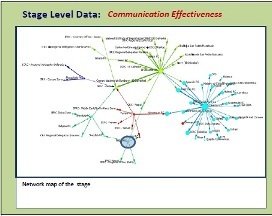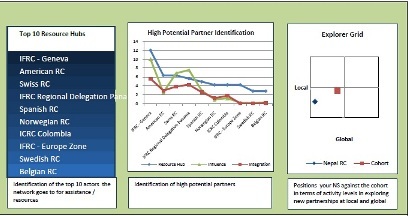Recent years have witnessed a surge of interest in capacity building and a renewed focus on the importance of a strong civil society. This has led many to invest substantial sums in efforts to build local organizational capacity. The problem is that no one knows precisely which CD initiatives work best, when and why. A recently completed research initiative conducted by Root Change on behalf of the International Federation of the Red Cross and the American Red Cross is providing some groundbreaking answers to some of these most difficult questions.
In data collected to determine an organization’s web of social relations and interactions, we can see highly consistent patterns of interaction associated with higher performance. CSOs that effectively link within a community of peers benefit from a flow of trust, reciprocity, information exchange and the norms of cooperation that are embedded in these relationships. What we have learned is that the resources available within a CSO’s network are as critical to the understanding of organizational capacity as the substance of capacity development interventions themselves.
In this global study, which involved over 18 countries and more than 50 peer researchers, recent advances in social network analysis technology allowed the research team to map, with unprecedented detail, the networking behavior of large numbers of people working in CSOs. By comparing data gathered from all
these individuals working in more than a dozen countries with performance data from their CSO, we can identify both the substance of communication and the networking patterns that enhance organizational capacity.
Based on these new insights, Root Change has developed STAR(System for Transformation and Results) with the American Red Cross. STAR produces data signatures for six performance “drivers”, capacities that were predictive of a national society’s overall composite organizational development effectiveness score.
They were:

|
Communication Effectiveness: This driver is concerned with how a CSO develops the skills needed to engage in productive consultation and coordination with internal stakeholders and partners.
|

|
Impact Assessment: This driver is concerned with how a CSO collects, shares and uses information about the impact of its capacity-development work.
|

|
Adaptive Planning: This driver is concerned with how a CSO customizes its capacity-development activities to reflect local needs, priorities and resources.
|

|
People Development: This driver is concerned with how a CSO prepares board members, paid staff and volunteers at all levels of their “careers,” to make significant contributions to the organization’s work.
|

|
Analysis: This driver is concerned with how a CSO develops the skills needed to identify trends related to vulnerability; the root causes of vulnerability; the ways in which these root causes interact with one another; and, the potential value of proposed programs.
|

|
Organizational Learning: This driver is concerned with how a CSO develop the skills needed to generate new knowledge; to identify and share lessons learned; and to use lessons learned to improve programs.
|
Example of a national society STAR Dashboard for Communication Effectiveness Driver

|

|
STAR's innovation is to simultaneously measure levels of performance on six capacity drivers while also measuring six factors that significantly shape driver performance: internal consensus; external linkages; resources (human, material and financial); skills and knowledge; leadership commitment; staff and volunteer motivation. Thus, STAR users have the information they need to make decisions about what performance challenges to address and how best to address them.
Action planning is an important aspect of the STAR process. The STAR Tool Suite includes a participantdriven process to analyze findings and the STAR Change Planner that helps users link assessment findings to capacity-building initiatives. Data processing produces a rich range of scored reports that help organizations see more clearly their behavioral patterns and capacity-building needs and opportunities. Finally, STAR mixes the best of dynamic, participatory techniques to engage and energize participants, with a methodologically strong scoring process based on rubrics. The capacity assessment and planning process is designed to be, in itself, transformational.

|
Past Work
STAR
GIIMAP
Innovation Scouts
Community Links
Social Ventures